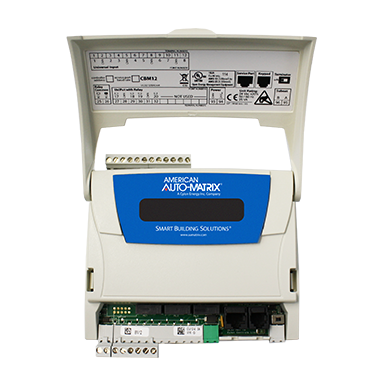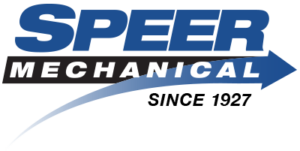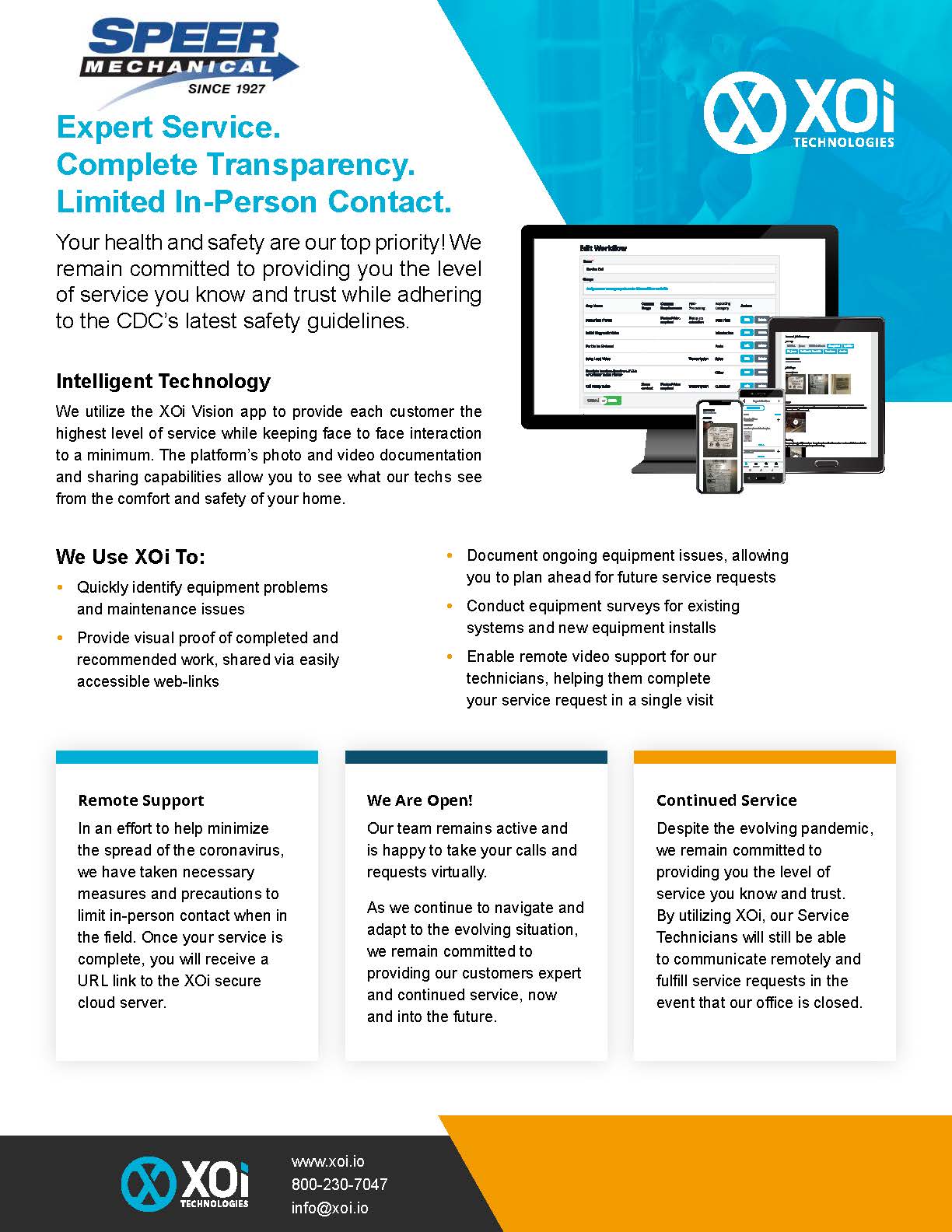Service Matters: Reopening Sterilization and Disinfecting Recommendations
 Whether you own a business or run a school, reopening America requires all of us to move forward together to reduce our risk of exposure to the virus that causes COVID-19. As many offices and businesses prepare to return to work, it will be more important than ever to make sure your Back-to-Work Plan includes the proper level of professional cleaning and disinfection of HVAC equipment and domestic water systems. In addition to face coverings, daily health assessments, good hygiene, frequent handwashing and social distancing, we would also recommend preparing your workplace in the following ways:
Whether you own a business or run a school, reopening America requires all of us to move forward together to reduce our risk of exposure to the virus that causes COVID-19. As many offices and businesses prepare to return to work, it will be more important than ever to make sure your Back-to-Work Plan includes the proper level of professional cleaning and disinfection of HVAC equipment and domestic water systems. In addition to face coverings, daily health assessments, good hygiene, frequent handwashing and social distancing, we would also recommend preparing your workplace in the following ways:
1.Preventive Maintenance + Sterilization of HVAC Equipment
The CDC has issued several recommendations for effective cleaning of facilities, including specialized cleaning and disinfecting recommendations for facilities with confirmed or suspected cases of COVID-19.
These recommendations include:
- Sterilization of coils
- Filter changes
- Annual preventive maintenance of cooling equipment
Speer Mechanical complies the environmental health and safety needs of all customers. Existing service contract customers will be prioritized when scheduling preventive maintenance and equipment upgrades in the coming weeks and months.
2.Flushing and Disinfecting Domestic Water
- After a period of vacancy or reduced usage, all building owners and managers should revisit their water management program to ensure effective treatment.
- The CDC has provided toolkit that addresses ASHRAE Standard 188: Legionellosis: Risk Management for Building Water Systems (ANSI approved) and ASHRAE
Guideline 12-2000: Minimizing the Risk of Legionellosis Associated with Building Water Systems. This toolkit includes a worksheet which will help determine if a water management program is necessary and examples of common water problems and how to address them.
Best practices outlined by the CDC, WHO and the Ohio Department of Health are evolving as we learn more about COVID-19. We will keep you updated on the latest recommendations and how it applies to your operation.
For more information, please reference the links below.
Service Matters: Building Operations Recommendations During COVID-19 Pandemic
Speer Mechanical is committed to continuing to provide the best service for our customers during the COVID-19 pandemic. COVID-19 is a highly infectious respiratory disease which includes symptoms such as cough, fever, tiredness, and in severe cases, difficulty breathing. According to the WHO (World Health Organization), “COVID-19 primarily spreads through droplets or particles of saliva or discharge from the nose when an infected person coughs or sneezes…” Following the guidelines set by the CDC (Center for Disease Control and Prevention) and WHO including following stay at home orders, social distancing, disinfecting frequently touched surfaces, installing additional hand sanitation dispensers, and supervising or closing food preparation areas, coffee stations, and drinking fountains will help to flatten the curve and reduce the number of infections.

Many public buildings, considered essential, remain open. This includes food, hardware, drug stores, banks, and healthcare facilities.
Though HVAC systems in non-medical buildings only play a small role in transmission of the disease, systems would circulate the mentioned droplets and particles which could infect someone. Per the guidance from global society, ASHRAE (American Society of Heating, Refrigerating and Air-Conditioning Engineers), Speer Mechanical recommends the following actions for HVAC systems in non-medical buildings:
- Increase outdoor air ventilation (use caution in highly polluted areas); with a lower population in the building, this increases the effective dilution
ventilation per person.- Disable demand-controlled ventilation (DCV).
- Further open minimum outdoor air dampers, as high as 100%, thus eliminating recirculation (in the mild weather season, this need not affect thermal
comfort or humidity, but clearly becomes more difficult in extreme weather).
- Improve central air filtration to the MERV-13 or the highest compatible with the filter rack, and seal edges of the filter to limit
bypass. - Keep systems running longer hours, if possible 24/7, to enhance the two actions above.
- Consider portable room air cleaners with HEPA filters.
- Consider UVGI (ultraviolet germicidal irradiation), protecting occupants from radiation, particularly in high-risk spaces such as waiting rooms, prisons and shelters.
Many construction sites already follow many of the guidelines as most, but not all, are outdoors or partially enclosed and are well ventilated and workers already use personal protective equipment including masks and gloves.
There is no vaccine for COVID-19. As a community, we have a responsibility to each other to control the spread of the disease.
For more information, please visit the following websites:
World Health Organization: https://www.who.int/
Center For Disease Control and Prevention: https://www.cdc.gov/
Service Matters: Speer Mechanical Response to Coronavirus
I am sure many of you have been following the news regarding the Coronavirus and its spread to the US. In response to this, please read the attached Speer Industries office policy on Coronavirus. Also attached is information from the CDC. What impact the Coronavirus may have on our field operations is under discussion. However, no employee should report to work if they are exhibiting any symptoms that are similar to those of the Coronavirus or believe they have been exposed to the Coronavirus.
Information is changing daily, and the best source for updates is: The CDC: www.cdc.gov
This is an emerging and rapidly evolving situation, and no one knows how this situation will progress and when it will end. We are trying to find a supply of antibacterial soap, disinfectant wipes, etc., to keep in the office and ask you to wipe down your own work areas every day including keyboards and phones. After using a conference room please wipe down table, chairs, and phone. The cleaning products should remain in the office because they are in limited supply and on backorder. We will try and distribute them next week. Exempt, salaried employees need to retain your vacation time just in case you or a member of your family become ill, area schools close, etc. If this happens, we may be able to consider some work from home options for some positions.
Following the lead from our State Health Department we are advising everyone to not shake hands, please limit your exposure to large groups, and limit all visitor meetings at Speer Mechanical. We will keep you advised of any changes regarding our company policy or operations.
advice and be properly tested by a qualified healthcare provider and receive a negative diagnosis for infection.
consideration. The company reserves the right to require you to work from home, if it is feasible.
they may return to work. Information pertaining to the
Policy Update: March 20, 2020
for all individuals who might encounter these operations, as well as any of our client’s requirements.
- You must take your temperature every morning before coming to work.
- You cannot come to work if you have a fever.
- You cannot come to work if you have tested positive for COVID19 – until you have been symptom free for 14 days or are cleared in writing by a medical professional.
- You cannot come to work if you have completed a trip to a CDC Categorized Coronavirus Warning Level 3 location.
- You must notify your manager if you have encountered anyone who has tested positive for COVID19
- You must notify your manager if you have encountered anyone who has a fever
- Wash your hands frequently with soap and water for at least 20 seconds or use hand sanitizer.
- If you need to cough or sneeze use a tissue and discard the tissue into the trash. If you do not have a tissue use the crook of your elbow.
- Disinfect your work area.
- Keep your distance from other workers – at least 6 feet of separation.
- Do not share tools and disinfect tools after use.
Solving the Conundrum of Open Protocols in Building Automation Control Systems
Even with widely available product flexibility for today’s building automation control systems, building owners and facility directors can struggle with the complexity in communications between automation control systems. Effective building automation requires complex communication between all kinds of different building systems—lights, mechanical equipment, security systems—the list seemingly goes on and on.
Historically, proprietary control systems limited product flexibility, and subjected building owners to potentially increased costs by limiting competition. While reliance on strictly proprietary systems is declining (mainly driven by web based solutions), truly open systems can still be challenging.
What Exactly Are Protocols in Building Automation Control Systems?
Protocols are simply communication and data sharing rules and standards related to building automation equipment that are developed and maintained by independent organizations.

What Exactly Are Protocols in Building Automation Control Systems?
Protocols are simply communication and data sharing rules and standards related to building automation equipment that are developed and maintained by independent organizations.
What Are the Advantages of Industry Standard Protocols?
Advantages of utilizing industry-standard protocols include:
- Readily available updates as technology evolves.
- Support by multiple manufacturers, software vendors, and installers; bringing added flexibility and potential cost savings.
- Ease of communication with building sub-systems such as chillers, lighting, etc.

What Are Some Common, Industry-Standard Protocol Types?
BACnet is a building automation protocol that is an ANSI standard under the auspices of ASHRAE. Products are certified for compliance by the BACnet Testing Laboratories (BTL). BACnet applications support many building operations including HVAC, lighting, fire protection, and security.
LonWorks is another building automation protocol also accepted by ANSI. It is an international standard, primarily utilized in HVAC and lighting, with some utility and process applications also.
Working Toward Complete Open Protocols in Your Building?
Here are some tips to consider.
- Rely on a systems-integrator partner who is committed to open protocols, non-use of proprietary products, and can guide you through the available choices.
- Use only devices and products that are “certified” by the specific protocol organization. Avoid those devices and products that are only labeled as “compatible.”
- Ask Questions:
- How many vendors support this protocol?
- How will it work with the equipment already in my building?
- Can I add devices later? How much will it cost to do so?
- Are there any licensing fees required?
- How does remote monitoring and alarming work?
- What is the hourly rate for service, programming, etc., and how many support people (techs, engineers, programmers) are available?
- What is guaranteed response time for service?
Need more information? Speer Mechanical is fully committed to supplying our customers with complete open protocol control systems through the utilization of Tridium front end integration, and BTL listed and certified BACnet controllers. Contact us at 614.261.6331.

